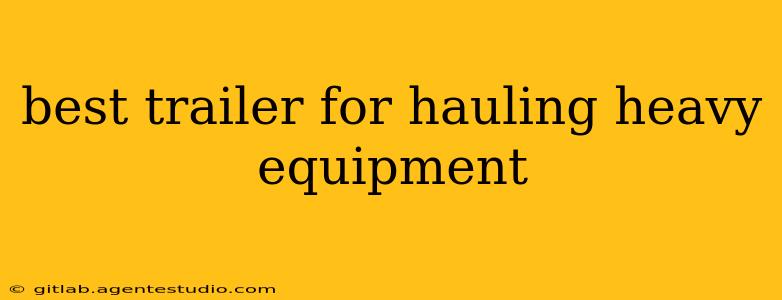Choosing the right trailer for hauling heavy equipment is crucial for safety, efficiency, and the longevity of both your equipment and your towing vehicle. This isn't a decision to be taken lightly; the wrong trailer can lead to accidents, costly repairs, and significant downtime. This guide will break down the key factors to consider when selecting the best heavy equipment trailer for your needs.
Understanding Your Equipment and Hauling Needs
Before diving into trailer types, you need a clear understanding of your specific requirements. Consider these critical factors:
- Weight: This is paramount. Accurately determine the gross vehicle weight rating (GVWR) of your equipment. Never exceed the trailer's rated capacity. Consider future equipment purchases and potential weight increases.
- Dimensions: Measure the length, width, and height of your equipment. Ensure the trailer's deck dimensions provide ample space, allowing for safe and secure loading and transportation. Account for overhang.
- Type of Equipment: Different equipment necessitates different trailer features. A crawler excavator will require different considerations than a skid steer. Consider the equipment's center of gravity and its impact on trailer stability.
- Hauling Distance and Frequency: Will you be hauling short distances or long hauls? Frequent use will necessitate a more robust and durable trailer.
- Budget: Heavy equipment trailers vary widely in price. Determine your budget upfront to narrow your options.
Types of Heavy Equipment Trailers
Several trailer types cater to heavy equipment hauling. Each offers unique advantages and disadvantages:
1. Gooseneck Trailers
- Pros: Excellent weight distribution, providing superior stability, especially for heavier loads. Offers a low deck height for easier loading. Typically longer, accommodating larger equipment.
- Cons: Requires a gooseneck hitch, which necessitates a pickup truck with a gooseneck ball. Generally more expensive than other options.
2. Lowboy Trailers
- Pros: Extremely low deck height, ideal for equipment with a low ground clearance. Offers excellent stability due to their design. Often utilized for oversized or heavy construction machinery.
- Cons: Can be challenging to maneuver in tight spaces due to their length and width. Usually requires a powerful towing vehicle.
3. Dump Trailers
- Pros: Facilitates easy unloading of materials like dirt, gravel, or debris. Useful when hauling alongside equipment.
- Cons: Not specifically designed for heavy equipment, but may be suitable for lighter pieces. Requires careful consideration of weight distribution.
4. Tilt Trailers
- Pros: Offers a hydraulic tilting mechanism for easy loading and unloading of equipment. Versatile for various equipment types.
- Cons: More complex mechanism can lead to higher maintenance costs. Can be more expensive than other options.
Key Features to Consider
Beyond the trailer type, several essential features impact performance and safety:
- Axles: The number and type of axles determine weight capacity and stability. Consider tandem or triple axles for heavier loads.
- Suspension: Suspension systems significantly impact ride quality and stability. Look for robust suspension systems designed for heavy-duty use.
- Tires: Heavy-duty tires are crucial for handling the weight and stress of heavy equipment. Consider tire size and load rating.
- Brakes: Electric brakes are essential for safety, especially with heavier loads. Ensure brakes are properly maintained.
- Lighting: Proper lighting is vital for safe operation, especially during nighttime travel. Confirm compliance with all relevant regulations.
- Tie-Down Points: Sufficient and strategically placed tie-down points are crucial for securing equipment during transit, preventing damage and accidents.
Choosing the Right Trailer: A Step-by-Step Approach
- Assess your needs: Carefully consider your equipment's weight, dimensions, and type.
- Research trailer types: Explore the various types available, focusing on those best suited to your needs.
- Compare features: Compare key features like axles, suspension, and braking systems.
- Check reviews and ratings: Read reviews from other users to gain insights into the performance and reliability of different trailers.
- Consider your budget: Set a realistic budget and stick to it.
- Consult with a professional: If needed, consult with a trailer specialist for expert advice.
Selecting the best heavy equipment trailer requires careful consideration of several factors. Prioritize safety, ensure compliance with regulations, and choose a trailer that meets your specific needs and budget for safe and efficient transportation of your valuable equipment. Remember to always consult with professionals and follow all safety guidelines when hauling heavy equipment.

